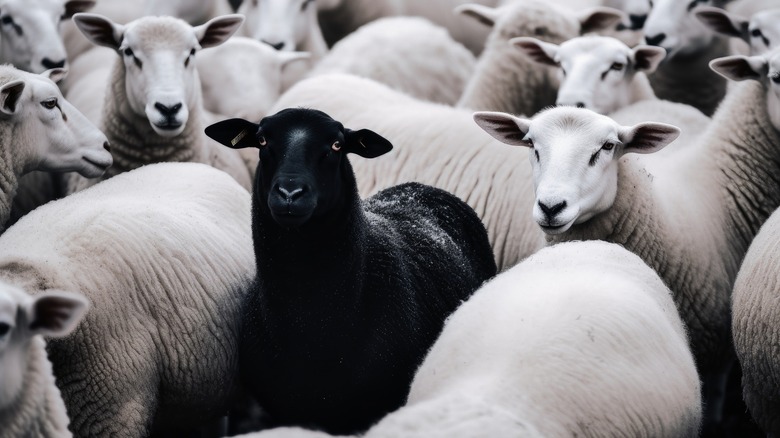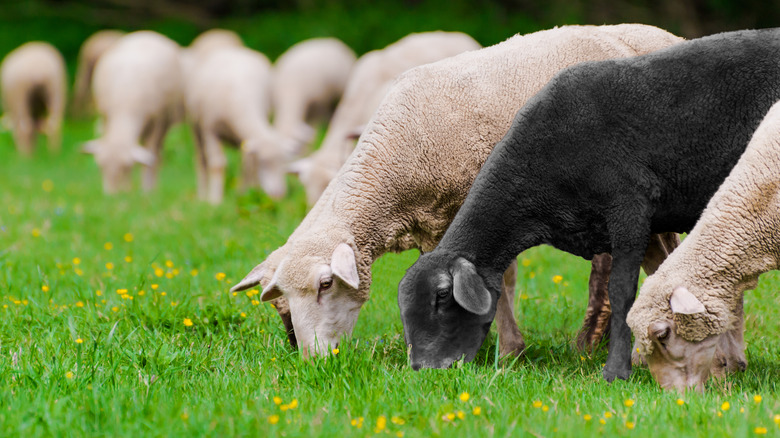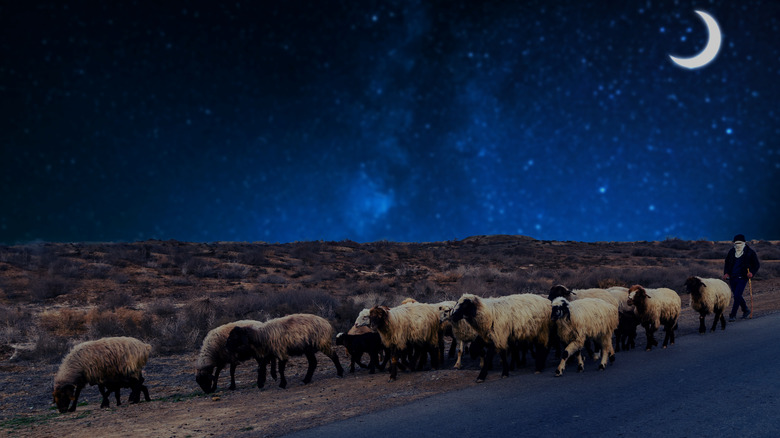The Unexpected Meaning Behind The Nursery Rhyme Baa, Baa, Black Sheep
Though the dark origins of fairy tales and nursery rhymes can sometimes be overstated, it is true that behind some of the innocuous-seeming rhymes and silly tales of childhood storytime lie grimmer implications. Early versions of "Snow White," for example, sentence the Evil Queen to death by dancing in hot iron shoes. And it's become popular to interpret "Ring Around the Rosie" as a fanciful explanation of the plague, though the evidence for that interpretation is thin.
Proposed unsavory meanings have gotten "Baa, Baa, Black Sheep" into periodic trouble — trouble that has attracted disproportionate media attention. According to "Culture Wars: The Media and the British Left," the Daily Star reported in 1986 that a nursery in Hackney had banned "Baa, Baa, Black Sheep" because the black sheep of the song was interpreted as a derogatory depiction of Black people. The story became a go-to for the British press, particularly for conservative commentators looking for an example of the country's left-wing ridiculously overreaching in the name of political correctness — despite the fact that there had been no ban.
The controversy around "Baa, Baa, Black Sheep" has persisted in Britain and elsewhere despite the flimsy basis of the original story. There were further reports that the rhyme was banned in the 1990s, Oxfordshire nurseries' lyrical modifications were taken as censorship in 2006, and Australian kindergartens really did ban the song in 2014 over fears of racism — to many parents' consternation.
The song is more likely about wool taxes
If there is a meaning to "Baa, Baa, Black Sheep" beyond whimsy, it may have been a grumble about tax policies. According to "The Oxford Dictionary of Nursery Rhymes," those in the wool trade haven taken "Baa, Baa, Black Sheep" as a comment on a medieval tax imposed on wool exports in England. The BBC echoed that interpretation, pointing specifically to the taxes imposed by Edward I.
Under Edward I, the value of a sack of wool was split three ways between the crown, the church, and the farmer whose sheep produced the wool. Alternate lyrics in early versions of the rhyme — "none for the little boy who lives down the lane" — are taken as complaints about the resulting scarcity in this reading. Katherine Elwes Thomas also argued in "The Real Personages of Mother Goose" that "Baa, Baa, Black Sheep" retained its nature as a protest into the reign of Edward VI, when skyrocketing prices helped spark revolts throughout the kingdom.
Still, even the taxation protest interpretation of "Baa, Baa, Black Sheep" has limited supporting evidence, and alternative readings have been proposed. In the same article that advocated for the tax theory, the BBC offered another: Farmers considered black sheep an unlucky and unlucrative addition to their livestock since their wool isn't dyable.
What we do know
If its origins and meaning are obscure, a few facts about the rhyme's history can be pinned down. "The Oxford Dictionary of Nursery Rhymes" dates the earliest printed example to "Tommy Thumb's Pretty Song Book" in 1744, and it notes that the lyrics have been remarkably consistent in the centuries since — variants only make minor changes.
"The Oxford Dictionary" also connects "Baa, Baa, Black Sheep" to "Twinkle, Twinkle, Little Star" and the alphabet song by way of the tune they all share. All three take their music from a French nursery rhyme, "Ah! Vous dirai-je, Maman," which most likely first came to the attention of English listeners when it was appropriated for the song "The Schoolmaster" in 1834. "The Book of World-Famous Music: Classical, Popular, and Folk" dates the first printed pairing of music and lyrics for "Baa, Baa, Black Sheep" to an 1879 collection, "Nursery Songs and Games."


